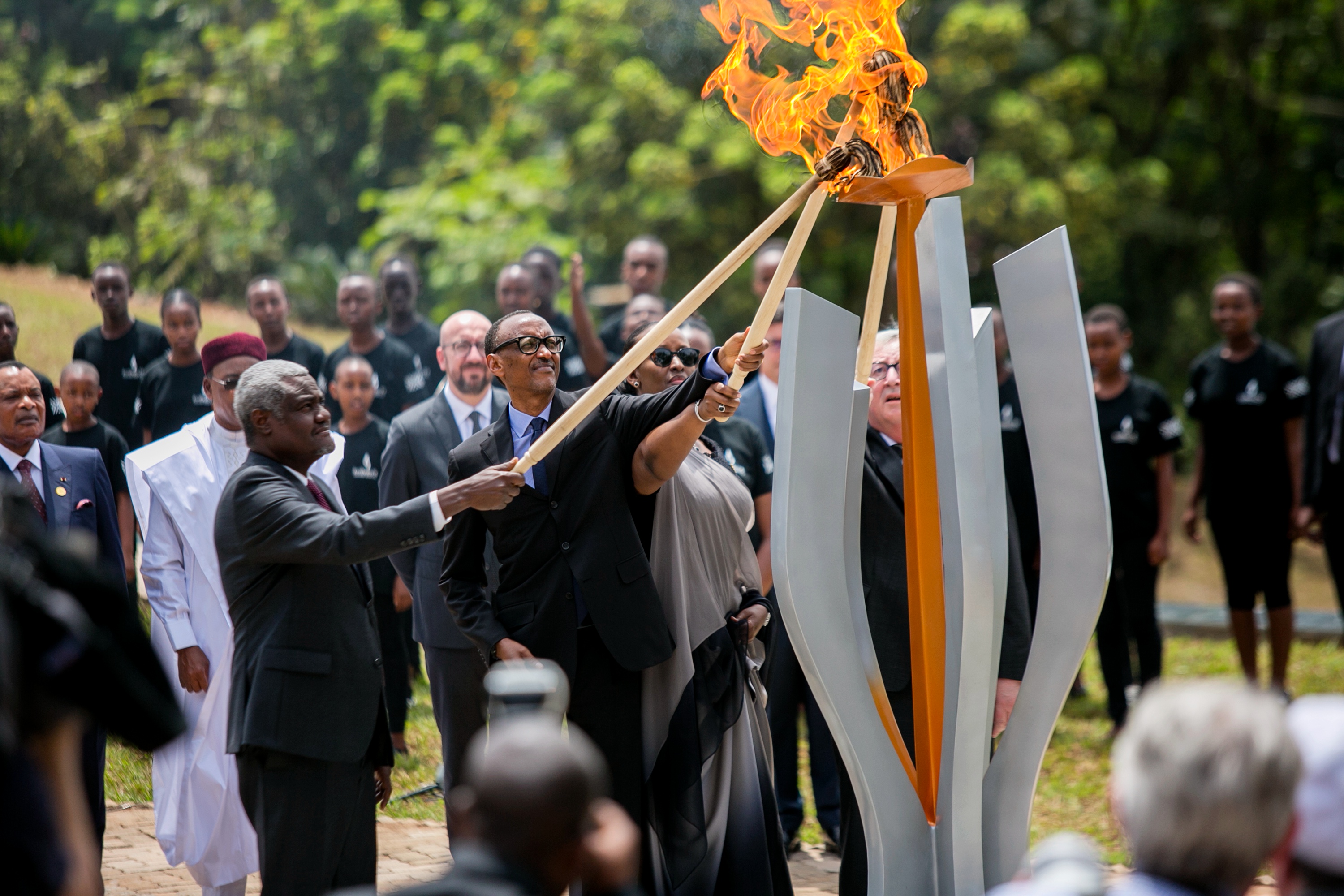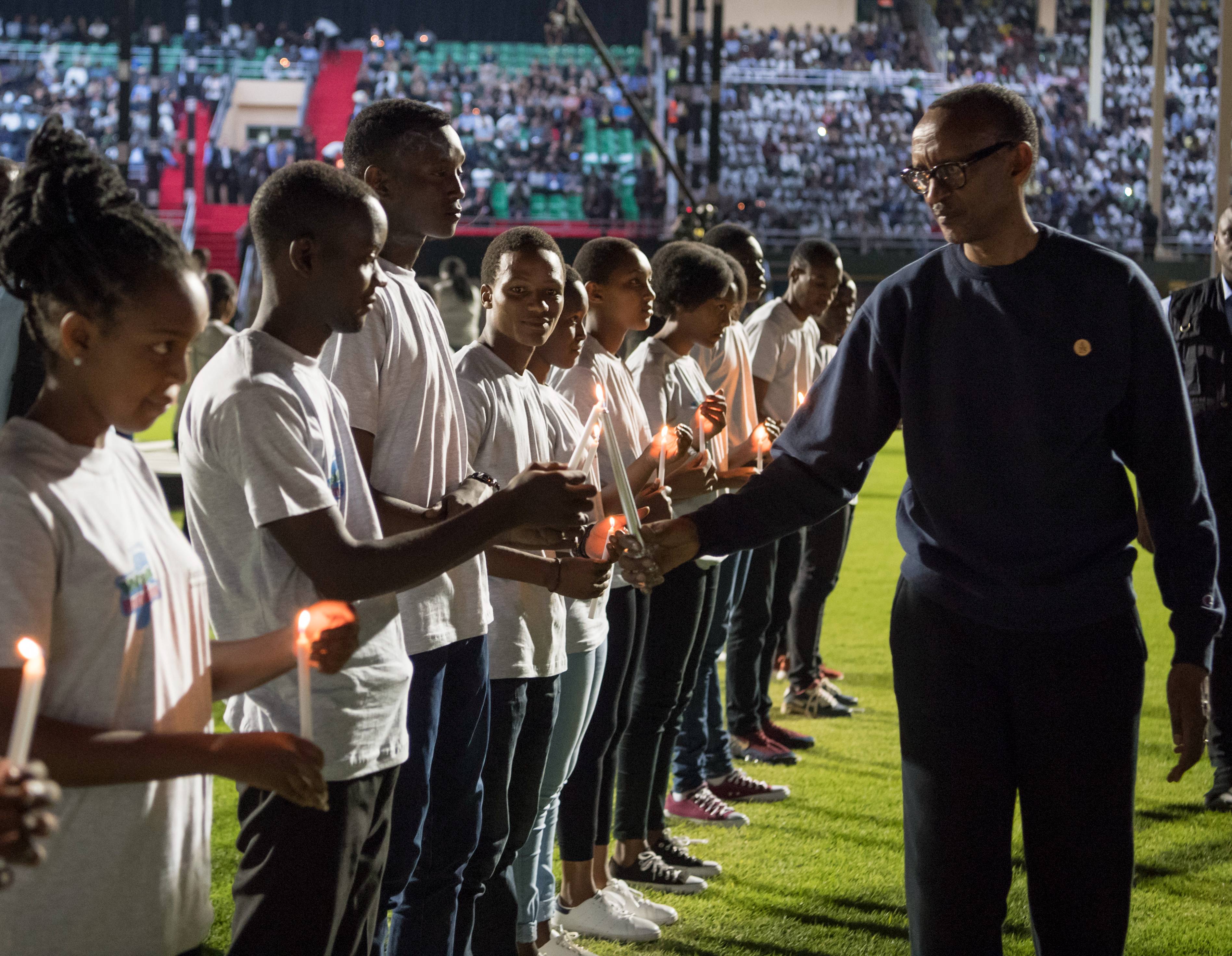
Rwanda commemorated the 25th anniversary of the 1994 Rwandan genocide against the Tutsi, in Kigali, capital of Rwanda, on April 7, 2019. (Xinhua/Office of the President of Rwanda)
A focus on homegrown initiatives contributes to reconciliation, solidarity, and human development in Rwanda after 1994.
By Xinhua writers Lyu Tianran and Wang Xiaopeng
KIGALI, Aug. 25 (Xinhua) -- Rwandan high school graduate Mike Manzi is scheduled to pursue his bachelor degree in China in a undergraduate program at the Alibaba Business School from September, after participating in two homegrown solidarity programs.
Manzi hoped to bring back business, ideas and innovation to his motherland, which in his eyes will become "an exemplary country in Africa and the world" due to the achievements in solidarity and partnership among the citizens since 1994. In that year, about 1 million people were killed in Rwanda during the 100-day genocide against the Tutsi.
In recent two decades, the country has registered remarkable progress in unity and reconciliation among Rwandans, according to the National Unity and Reconciliation Commission of Rwanda, which was created in 1999 to promote unity and reconciliation among Rwandans.
As part of efforts to reconstruct the country and nurture a shared national identity, the Rwandan government drew on aspects of Rwandan culture and traditional practices to enrich its development programs, including community mediators community courts "Gacaca," One Cow per Poor Family Program "Girinka," and community work "Umuganda."
"Homegrown solutions are so important in the life of Rwanda,"John Rucyahana, National Unity and Reconciliation Commission of Rwanda, told Xinhua. "Rwanda has a bad history, but from that history we need to know what led us into such history and correct that part of history together using our approach, concept."
"It should be our role to design what is good for us, and we need to take direction of our own choice. Our destiny should be in our own hands that is why homegrown solutions are vital in the life of Rwanda and the Rwandan people," said Rucyahana.
Manzi earlier this year took part in two homegrown solutions, solidarity camp "Ingando" and civic education program "Itorero," whose role in solidarity and reconciliation was significant.
The two programs help people better understand the country and its history, said Manzi, who wore a T-shirt and a cap when being interviewed.
He said, the participants lived together with one another in the camp, and they did things together, like sharing milk. "And they are friends," he said.
Traditional Itorero was a cultural school where Rwandans would learn language, patriotism, social relations, sports, dancing, songs and defence.
It was reintroduced in 2009 as a way to rebuild the nation's social fabric and mobilize Rwandans to uphold important cultural values. The program creates opportunities for participants to enhance positive values, build a sense of responsibility through patriotism and gain professional knowledge.
Ingando also has its roots in history for boosting solidarity. Nowadays, it enables Rwandans to face history, forging a common vision for a united future, and creating a forum for trust building and critical analysis of national challenges with a view to searching for solutions to address them.

A young Rwandan lights the candle for Rwandan President Paul Kagame at a night vigil to commemorate the 25th anniversary of the 1994 Rwandan genocide against the Tutsi, in Kigali, capital of Rwanda, on April 7, 2019. (Xinhua/Office of the President of Rwanda)
Rwandan President Paul Kagame earlier in August attended the closing ceremony of the 12th Itorero Indangamirwa, which was comprised of 698 trainees, including high school graduates and university students, as well as best performing public servants, in Gatsibo District, eastern Rwanda.
The trainees showcased what they learned at the ceremony including parade, martial arts and dance.
"Itorero is about raising our children and educating them in our culture. We want our country to be founded on our own values," Kagame said at the ceremony.
In addition to Itorero Indangamirwa, Itorero activities are implemented across the country at different levels including family level, village level, as well as at schools, public and private institutions.
Currently, about three quarters of Rwandans are under 30, and almost 60 percent of Rwandan people were born after the genocide.
"I would miss a lot of things, if I had not attended Itorero. I used to hear Rwandan values and patriotism but didn't keep them in mind. In Itorero they explain profoundly those values and we can explain them to our fellow youth too," said Pascaline Mukandayisenga, a trainee who is a high school graduate.
"Homegrown solutions are workable, and they have a historical background," said Rwandan scholar Tom Ndahiro, who works for the Kigali-based Interdisciplinary Genocide Studies Center.
When one talks about homegrown solutions, people understand, he said.
In poverty alleviation area, the nation kicked off its Girinka program. Originated from a concept introduced in 17th century, the social protection measure was aimed to ensure "no Rwandan child was ever to lack daily milk again while others had plenty."
Emmanuel Mateka, 66, was a beneficiary of the program. In 2009, when his family lost the only cow, the government sent a cow aged six month to his house, under the program.
The cow helped Mateka raise the six children with milk and later enabled the family to shake off poverty, as there were five heads of cattle by August 17 in his cow ring.
"We can get about 20 liters of milk from the cows every day, earning about 7 dollars after selling 15 liters in the market," Mateka said, adding that according to the tradition, he "returned" the first cow calf to the government, which sent to a family in need nearby.
According to government report released in June, 2018, Girinka program has already distributed over 297,060 cows, thus benefiting more than 1. 2 million Rwandans.
Ndahiro said the Girinka program is important for improve people's livelihood and the pass-on tradition of the program has helped close the relationship among residents in the same neighborhood, as giving someone a cow means sharing the most prized belonging in the tradition.
The homegrown efforts for reconciliation had won applause from the international community. The World Bank said in a report released in April that a "strong focus on homegrown policies and initiatives has contributed to significant improvement in access to services and human development indicators" in Rwanda. Enditem



